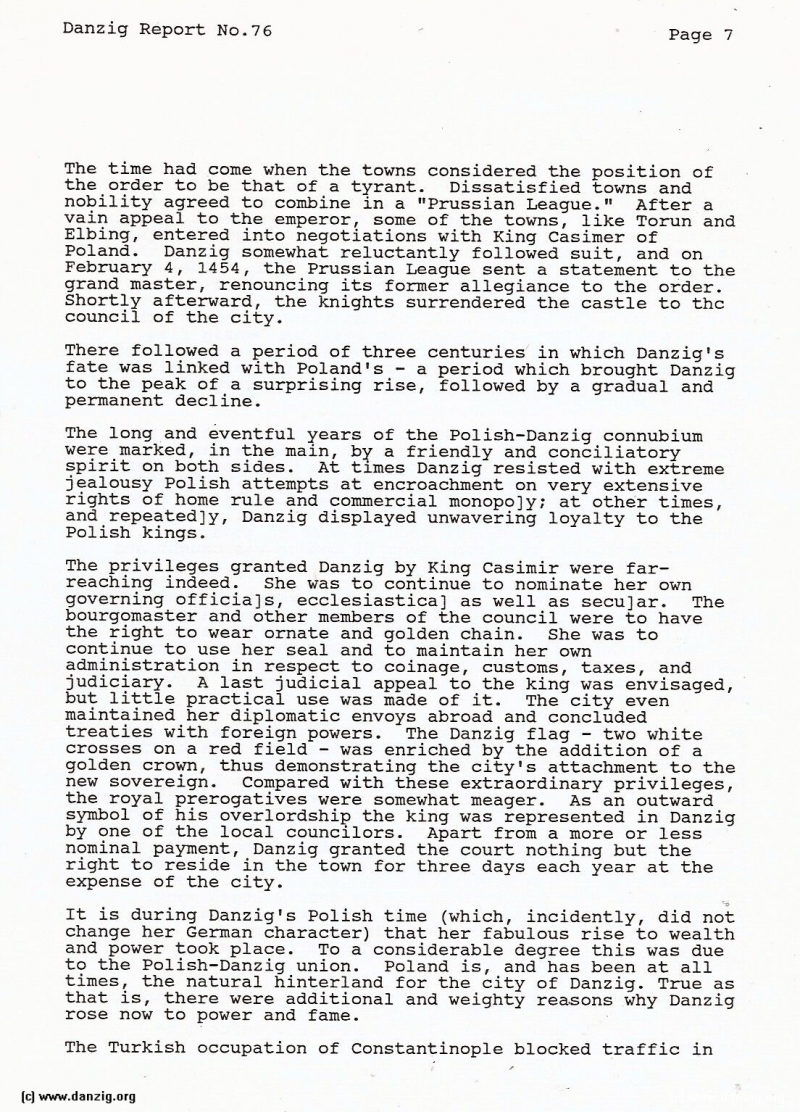
The time had come when the towns considered the position of the order to be that of a tyrant. Dissatisfied towns and nobility agreed to combine in a “Prussian League.” After a vain appeal to the emperor, some of the towns, like Torun and Elbing, entered into negotiations with King Casinier of Poland. Danzig somewhat reluctantly followed suit, and on February 4, 1454, the Prussian League sent a statement to the grand master, renouncing its former allegiance to the order. Shortly afterward, the knights surrendered the castle to thc council of the city.
There followed a period of three centuries in which Danzig’s fate was linked with Poland’s - a period which brought Danzig to the peak of a surprising rise, followed by a gradual and permanent decline.
The long and eventful years of the Polish-Danzig connubium were marked, in the main, b a friendly and conciliatory spirit on both sides. At times Danzig resisted with extreme jealousy Polish attempts at encroachment on very extensive rights of home rule and commercial monopo]y; at other times, and repeated]y, Danzig displayed unwavering loyalty to the Polish kings.
The privileges granted Danzig by King Casimir were far- reaching indeed. She was to continue to nominate her own governing officia]s, ecclesiastica) as well as secu)ar. The bourgomaster and other members of the council were to have the right to wear ornate and golden chain. She was to continue to use her seal and to maintain her own
administration in respect to coinage, customs, taxes, and judiciary. A last judicial appeal to the king was envisaged, but little practical use was made of it. The city even maintained her diplomatic envoys abroad and concluded treaties with foreign powers. The Danzig flag - two white crosses on a red field — was enriched by the addition of a golden crown, thus demonstrating the city’s attachment to the new sovereign. Compared with these extraordinary privileges, the royal prerogatives were somewhat meager. As an outward symbol of his overlordship the king was represented in Danzig by one of the local councilors. Apart from a more or less nominal payment, Danzig granted the court nothing but the right to reside in the town for three days each year at the expense of the city.
It is during Danzig’s Polish time (which, incidently, did not change her German character) that her fabulous rise to wealth and power took place. To a considerable degree this was due to the Polish—Danzig union. Poland is, and has been at all times, the natural hinterland for the city of Danzig. True as that is, there were additional and weighty reasons why Danzig rose now to power and fame.
The Turkish occupation of Constantinople blocked traffic in
Danzig Report Vol. 1 - Nr. 76 - July - August - September - 1992, Page 7.
Hits: 4225
Added: 02/07/2015
Copyright: 2026 Danzig.org

